|
In Search of the Supreme Flaw of the Land:
The Bill of Rights
enforced in equity; performance will
be decreed, and conveyances compelled.
See, generally, as to contracts, Bouv. Inst. Index;
Parson, Chitty, Comyns, Leake, Anson, and Story, on Contracts;
Com. Dig. Abatement (E, 12) (F, 8), Admiralty (E.10, 11),
Action
on Case on Assumpsit, Agreement, Bargain and Sale, Baron et Feme (2),
Condition,
Debt (A, 8, 9), Enfant (B, 5), Idiot (D, 1), Merchant
(E, 1),
Pleader (2 W, 11, 43), Trade (D, 3), War (B,
2); Bac. Abr.
Agreement, Assumpsit, Condition, Obligation;
Vin. Abr. Condition, Contract and Agreements, Covenant, Vendor, Vendee;
2 Belt, Sup. Ves. 260, 295, 376, 441; Yelv. 47; 4 Ves. 497,
671: Arch. Civ. Pl. 22; La. Civ. Code, 3, tit. 3-18;
Poth. Obl.; Maine, Anc. Law; Austin, Jurisp.; Sugd. Ven.
& P.; Long, Sales (Rand. ed.), and Benj. Sales; Jones,
Story, and Edwards, on Bailment; Toull.
Dr. Civ. tom. 6, 7;
Hamm. Part. c. 1; Calv. Par.; Chitty, Prac, Index.
Each subject included in the law of contracts will be
found discussed in the separate articles of this Dictionary. See
AGREEMENT; APPORTIONMENT; APPROPRIATION; ASSENT;
ASSIGNMENT; ASSUMPSIT; ATTESTATION; BAILMENT; BARGAIN
AND SALE; BIDDER; BILATERAL CONTRACT; BILL OF EXCHANGE;
BUYER; COMMODATE; CONDITION; CONSENSUAL; CONJUNCTIVE;
CONSUMMATION; CONSTRUCTION; COVENANT; DEBT; DEED;
DELEGATION; DELIVERY; DISCHARGE OF A CONTRACT; DISJUNCTIVE;
EQUITY OF REDEMPTION; EXCHANGE; GUARANTY; IMPAIRING THE
OBLIGATION OF CONTRACTS; INSURANCE; INTEREST; INTERESTED
CONTRACTS; ITEM; MISREPRESENTATION; MORTGAGE; NEGOCIORUM
GESTOR; NOVATION; OBLIGATION; PACTUM CONSTITUTAE PECUNIAE;
PARTIES; PARTNERS; PARTNERSHIP; PAYMENT; PLEDGE;
PROMISE; PURCHASER; QUASI CONTRACTUS; REPRESENTATION;
SALE; SELLER; SETTLEMENT; SUBROGATION; TITLE.
— Bouvier's Law Dictionary, 1889

Courts of the United States. "Court of the
United States" means any of the following courts: the Supreme Court
of the United States, a United States court of appeals, a United States
district court, the District of Columbia Court of Appeals, the Superior
Court of the District of Columbia, the District Court of Guam, the District
Court of the Virgin Islands, the United States Court of Claims, the United
States Court of Customs and Patent Appeals, The Tax Court of the United
States, the Customs Court, bankruptcy courts, and the Court of Military
Appeals. 28 U.S.C.A. § 451. Also, the senate sitting as
a court of impeachment.
— Black's Law Dictionary, 1979


Criminal .... Criminal contempt.
A crime which consists in the obstruction of judicial duty generally resulting
in an act done in the presence of the court; e.g. contumelious
conduct directed to the judge or a refusal to answer questions after immunity
has been granted. Conduct directed against the majesty of the law
or the dignity and authority of the court or judge acting judiciously,
whereas a "civil contempt" ordinarily consists in failing to do something
ordered to be done by a court in a civil action for the benefit of an imposing
party therein. Sullivan v. Sullivan, 16 Ill. App.3d 549, 306 N.E.2d
604, 605. See also Contempt
....
— Black's Law Dictionary, 1979

Defamation. Holding up of a person to ridicule,
scorn or contempt in a respectable and considerable part of the community;
may be criminal as well as civil. Includes both libel and slander.
Defamation is that which tends to injure reputation;
to diminish the esteem, respect, goodwill or confidence in which the plaintiff
is held, or to excite adverse, derogatory or unpleasant feelings or opinions
against him. Statement which exposes person to contempt, hatred,
ridicule or obloquy. McGowen v. Prentice, La.App., 341 So.2d 55,
57. The unprivileged publication of false statements which naturally
and proximately result in injury to another. Wolfson v. Kirk, Fla.App.,
273 So.2d 774, 776.
A communication is defamatory if it tends so to harm the
reputation of another as to
 |
Page 35
|
|

![]()
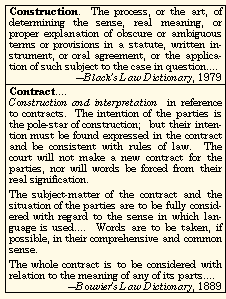 Many
people talk about the Constitution, but few of them know as much about
it as they think they do. One common deficiency is the failure to
recognize the Constitution as a contract. However, it is a contract
and it must be understood as such.
Many
people talk about the Constitution, but few of them know as much about
it as they think they do. One common deficiency is the failure to
recognize the Constitution as a contract. However, it is a contract
and it must be understood as such.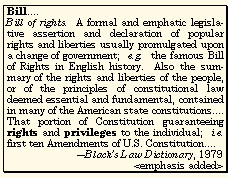 Bills
of rights are not understood any better than are constitutions. Even
Black's Law dictionary is in error in that regard, as you can see in the
accompanying definition. That is, a bill of rights doesn't address
privileges. It addresses rights.
Bills
of rights are not understood any better than are constitutions. Even
Black's Law dictionary is in error in that regard, as you can see in the
accompanying definition. That is, a bill of rights doesn't address
privileges. It addresses rights.
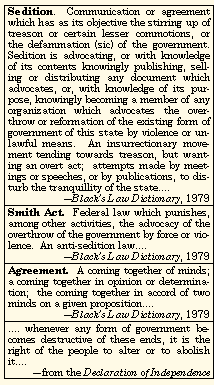 In
spite of the First Amendment, there are limitations on the freedoms of
speech and of the press. A good example is with regard to sedition.
Any movement tending toward unspecified “commotions”, even though lacking
any overt act, is punishable.
In
spite of the First Amendment, there are limitations on the freedoms of
speech and of the press. A good example is with regard to sedition.
Any movement tending toward unspecified “commotions”, even though lacking
any overt act, is punishable. There
are problems with the language of the Freedom of Assembly provision
of the First Amendment. A contract must be understood according to
what it says, and not according to what somebody believes the writer meant
to say. If the language of this provision is analyzed according to
the punctuation as written, then that language becomes:
There
are problems with the language of the Freedom of Assembly provision
of the First Amendment. A contract must be understood according to
what it says, and not according to what somebody believes the writer meant
to say. If the language of this provision is analyzed according to
the punctuation as written, then that language becomes:
 In
the fifth and sixth provisions, the language is incomplete. The writers
used one word in the first provision, a different word in the second provision,
and a different word in the third and fourth provisions. No one knows
what word they might have intended for the fifth and sixth provisions.
Perhaps they intended to say, "[Congress shall make no law] abridging
the right of the people peaceably to assemble, and to petition the Government
for a redress of grievances." However, the grammar is equally valid
as, "[Congress shall make no law] securing the right of the people
peaceably to assemble, and to petition the Government for a redress of
grievances." Lacking proper language, an enforceable interpretation
of these provisions is impossible.
In
the fifth and sixth provisions, the language is incomplete. The writers
used one word in the first provision, a different word in the second provision,
and a different word in the third and fourth provisions. No one knows
what word they might have intended for the fifth and sixth provisions.
Perhaps they intended to say, "[Congress shall make no law] abridging
the right of the people peaceably to assemble, and to petition the Government
for a redress of grievances." However, the grammar is equally valid
as, "[Congress shall make no law] securing the right of the people
peaceably to assemble, and to petition the Government for a redress of
grievances." Lacking proper language, an enforceable interpretation
of these provisions is impossible.
 Any
meeting that attempts to disturb the tranquility of the state (sedition)
lacks First Amendment protection. Any assembly that results in "antisocial"
behavior of the group is deemed an unlawful assembly. In fact, people
ought to have the right to use any method whatsoever to reform or overthrow
their government. If they're limited to legal (that is, government
approved) methods, then they're limited to methods that can be defined,
regulated, and controlled by the government that they're trying to reform
or overthrow. Any such attempted restriction of the people is, in
and of itself, a sufficient reason to overthrow the government.
Any
meeting that attempts to disturb the tranquility of the state (sedition)
lacks First Amendment protection. Any assembly that results in "antisocial"
behavior of the group is deemed an unlawful assembly. In fact, people
ought to have the right to use any method whatsoever to reform or overthrow
their government. If they're limited to legal (that is, government
approved) methods, then they're limited to methods that can be defined,
regulated, and controlled by the government that they're trying to reform
or overthrow. Any such attempted restriction of the people is, in
and of itself, a sufficient reason to overthrow the government.
 According
to this amendment, the purpose of keeping and bearing arms is to defend
the security of a "free State", whatever that is. That is a very
different purpose than an individual defending himself, his property, or
his liberty. In fact, governments generally regard armed citizens
as a threat to the security of the state. Thus from the point of
view of government, any construction of the Second Amendment that allows
just anybody to keep and bear arms causes the amendment to be inherently
self-contradictory.
According
to this amendment, the purpose of keeping and bearing arms is to defend
the security of a "free State", whatever that is. That is a very
different purpose than an individual defending himself, his property, or
his liberty. In fact, governments generally regard armed citizens
as a threat to the security of the state. Thus from the point of
view of government, any construction of the Second Amendment that allows
just anybody to keep and bear arms causes the amendment to be inherently
self-contradictory.
 In
time of peace, all that's required to quarter soldiers in your house is
the consent of the owner. That might not at first seem like a loop-hole,
but it is. The consent of the mortgage company might be sufficient.
Or you may be one of several joint owners who might consent over your objections.
Does your wife agree with your politics? What if you don't consent
but she does?
In
time of peace, all that's required to quarter soldiers in your house is
the consent of the owner. That might not at first seem like a loop-hole,
but it is. The consent of the mortgage company might be sufficient.
Or you may be one of several joint owners who might consent over your objections.
Does your wife agree with your politics? What if you don't consent
but she does?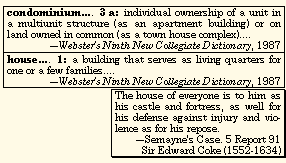 The
Third Amendment protects you only if you live in a house. What if
you own and live in a recreational vehicle or a mobile home? In recent
years, courts have ruled that recreational vehicles lack the same Third
Amendment protections as houses but fall instead under the obligations
associated with automobiles.
The
Third Amendment protects you only if you live in a house. What if
you own and live in a recreational vehicle or a mobile home? In recent
years, courts have ruled that recreational vehicles lack the same Third
Amendment protections as houses but fall instead under the obligations
associated with automobiles.
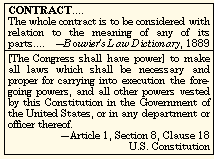 In
time of war, the method of using your house to quarter soldiers need only
be prescribed by legislation. Under Article 1, Section 8, Clause
18, the Congress can pass any legislation that it considers to be necessary
and proper to execute any other power delegated in the Constitution, including
quartering soldiers in your house. Thus, the Third Amendment can
be accurately re-stated, without any change in meaning, as
In
time of war, the method of using your house to quarter soldiers need only
be prescribed by legislation. Under Article 1, Section 8, Clause
18, the Congress can pass any legislation that it considers to be necessary
and proper to execute any other power delegated in the Constitution, including
quartering soldiers in your house. Thus, the Third Amendment can
be accurately re-stated, without any change in meaning, as
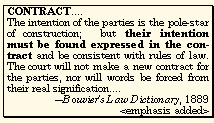 The
proximity of those two provisions in a single sentence creates the appearance
of a relationship between them. However, there isn't any language
whatsoever in this amendment that requires a search warrant as a prerequisite
for a search and seizure. The amendment only says that people shall be
safe from unreasonable searches and seizures and that if a warrant is obtained
for a search and seizure, then it shall satisfy certain conditions.
Those are two separate provisions each of which stands alone and neither
of which requires the other. Suppose that I said, "Delta Burke will
sleep well tonight, and so will I." Each statement may be true but
their proximity in the same sentence doesn't necessarily mean that Delta
Burke and I have anything at all to do with one another.
The
proximity of those two provisions in a single sentence creates the appearance
of a relationship between them. However, there isn't any language
whatsoever in this amendment that requires a search warrant as a prerequisite
for a search and seizure. The amendment only says that people shall be
safe from unreasonable searches and seizures and that if a warrant is obtained
for a search and seizure, then it shall satisfy certain conditions.
Those are two separate provisions each of which stands alone and neither
of which requires the other. Suppose that I said, "Delta Burke will
sleep well tonight, and so will I." Each statement may be true but
their proximity in the same sentence doesn't necessarily mean that Delta
Burke and I have anything at all to do with one another.

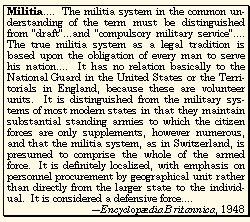 Even
for a capital or infamous crime, there are exceptions. The amendment
doesn't apply to cases arising in the army or in the navy. I don't
see any reason why citizens in military service should be excluded from
such protection. However, there's another even more puzzling exception,
and that is the militia. Clearly, the writers of the Fifth Amendment
considered the militia to be distinct from the military forces, since it
received special mention. That is completely consistent with the
definition given by the Encyclopedia Britannica, according to which the
militia is distinguished from the draft, from the military, and from the
National Guard. It is, rather, based on the "obligation of every
man to serve his nation". Accordingly, men (but not women) are excluded
from grand jury protection if they are in the militia and if the militia
is in actual service in time of war or public danger. That makes
it important to understand the meanings of
actual service and public
danger.
Even
for a capital or infamous crime, there are exceptions. The amendment
doesn't apply to cases arising in the army or in the navy. I don't
see any reason why citizens in military service should be excluded from
such protection. However, there's another even more puzzling exception,
and that is the militia. Clearly, the writers of the Fifth Amendment
considered the militia to be distinct from the military forces, since it
received special mention. That is completely consistent with the
definition given by the Encyclopedia Britannica, according to which the
militia is distinguished from the draft, from the military, and from the
National Guard. It is, rather, based on the "obligation of every
man to serve his nation". Accordingly, men (but not women) are excluded
from grand jury protection if they are in the militia and if the militia
is in actual service in time of war or public danger. That makes
it important to understand the meanings of
actual service and public
danger.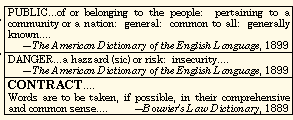 Does
the widespread use of illegal drugs constitute a time of public danger?
If so, can the government create a time of public danger just by making
something illegal? If there are terrorists at large in the world,
is that a time of public danger? If it's dangerous to go out at night,
if people feel insecure, is that a time of public danger? Look at
the definitions. The words must be taken in their comprehensive and
common sense. If people in the community generally feel insecure,
then it's a time of public danger.
Does
the widespread use of illegal drugs constitute a time of public danger?
If so, can the government create a time of public danger just by making
something illegal? If there are terrorists at large in the world,
is that a time of public danger? If it's dangerous to go out at night,
if people feel insecure, is that a time of public danger? Look at
the definitions. The words must be taken in their comprehensive and
common sense. If people in the community generally feel insecure,
then it's a time of public danger.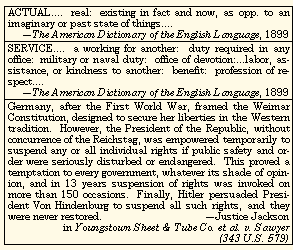 What
does it mean to be in actual service? The amendment doesn't say the
militia must be in military service. It says actual service.
Remember the Britannica definition of militia. "The true militia
system as a legal tradition is based upon the obligation of every man to
serve his nation." Does actual service include the civil service?
Does it include public officials? How about people who work for public
utilities, police departments, or fire departments? How about Amtrak
employees or postal workers? What about hospitals and air traffic
controllers? If an industry is defined as a service industry, are
workers in that industry in actual service? Just how should people
interpret the rhetoric in recent years about the service economy?
Just what does it mean for the militia (every man not in the military)
to be in actual service (serving his nation)?
What
does it mean to be in actual service? The amendment doesn't say the
militia must be in military service. It says actual service.
Remember the Britannica definition of militia. "The true militia
system as a legal tradition is based upon the obligation of every man to
serve his nation." Does actual service include the civil service?
Does it include public officials? How about people who work for public
utilities, police departments, or fire departments? How about Amtrak
employees or postal workers? What about hospitals and air traffic
controllers? If an industry is defined as a service industry, are
workers in that industry in actual service? Just how should people
interpret the rhetoric in recent years about the service economy?
Just what does it mean for the militia (every man not in the military)
to be in actual service (serving his nation)?
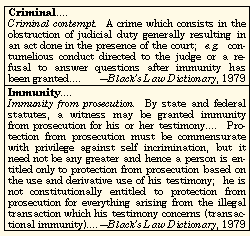 Furthermore,
protection against self-incrimination exists only in criminal cases.
Furthermore,
protection against self-incrimination exists only in criminal cases.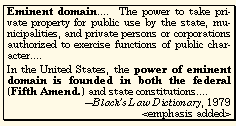 In
support of this assertion, using property as an example, I offer a portion
of the definition of eminent domain. Notice that the federal power
of eminent domain exists because of the Fifth Amendment. If
the so-called Bill of Rights had never been adopted, then private property
might have been a lot safer from the government.
In
support of this assertion, using property as an example, I offer a portion
of the definition of eminent domain. Notice that the federal power
of eminent domain exists because of the Fifth Amendment. If
the so-called Bill of Rights had never been adopted, then private property
might have been a lot safer from the government. This
power to take private property was granted generally by the Fifth Amendment.
It was granted specifically to the States by the Fourteenth Amendment,
but without the just compensation restriction. Thus the states need
not provide just compensation, but only provide by law how life, liberty,
or property is to be taken.
This
power to take private property was granted generally by the Fifth Amendment.
It was granted specifically to the States by the Fourteenth Amendment,
but without the just compensation restriction. Thus the states need
not provide just compensation, but only provide by law how life, liberty,
or property is to be taken.
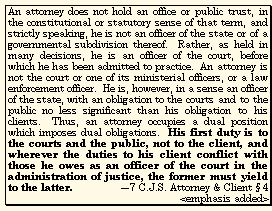 The
accused is guaranteed the right to assistance of counsel for his defense.
However, he isn't guaranteed the right to counsel of his choice, but only
the right to counsel. The government exercises great authority over
that choice by restricting it to licensed attorneys whose primary duty
is to the court (that is, to the government) rather than to the accused.
That renders this provision of the amendment something of a farce.
The
accused is guaranteed the right to assistance of counsel for his defense.
However, he isn't guaranteed the right to counsel of his choice, but only
the right to counsel. The government exercises great authority over
that choice by restricting it to licensed attorneys whose primary duty
is to the court (that is, to the government) rather than to the accused.
That renders this provision of the amendment something of a farce. Bills
of rights have their uses, but not the ones generally attributed to them.
For example, they don't prevent the encroachment of despotism to which
government naturally inclines. They can, however, help people to
understand what their rights ought to be and to recognize encroachments
upon those rights. As a benchmark of political conditions, they can
help people to know when the time has come to throw down yet another government.
Bills
of rights have their uses, but not the ones generally attributed to them.
For example, they don't prevent the encroachment of despotism to which
government naturally inclines. They can, however, help people to
understand what their rights ought to be and to recognize encroachments
upon those rights. As a benchmark of political conditions, they can
help people to know when the time has come to throw down yet another government.
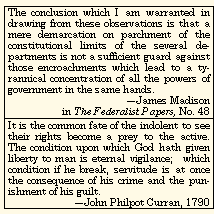 There
are lessons to be learned from these failures. It should not come
as a surprise that the paper boundaries of the U.S. Bill of Rights failed
to prevent the government's inevitable tendency toward despotism.
James Madison warned of that many years ago. The limits on government
must be inflexibly asserted in people's everyday lives. Freedom or
slavery both begin within each individual, and each individual must choose
one or the other. The lesson is that eternal vigilance is one of
those things that cannot be delegated.
There
are lessons to be learned from these failures. It should not come
as a surprise that the paper boundaries of the U.S. Bill of Rights failed
to prevent the government's inevitable tendency toward despotism.
James Madison warned of that many years ago. The limits on government
must be inflexibly asserted in people's everyday lives. Freedom or
slavery both begin within each individual, and each individual must choose
one or the other. The lesson is that eternal vigilance is one of
those things that cannot be delegated.